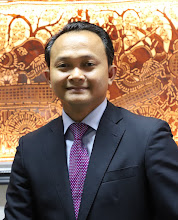នៅក្នុងដំណើរការកសាងប្រទេសកម្ពុជាត្រូវជួបនឹងបញ្ហាប្រឈម ២ នៅក្នុងទំនាក់ទំនងជាមួយតួអង្គបរទេស ដែលមានបំណងចាក់ពុម្ពកម្ពុជាឱ្យក្លាយជាទម្រង់ប្រជាធិបតេយ្យស្រមើស្រមៃ ដែលល្អគ្មាន ២ ក្នុងលោកជាមួយនឹងតួអង្គក្នុងស្រុកដែលមានគោលនយោបាយសមតាមបំណងប្រាថ្នារបស់គេ។
បញ្ហាប្រឈមដំបូងគឺ “អន្តរភាវូបនីយកម្មនៃបញ្ហាក្នុងស្រុករបស់កម្ពុជា” ហើយបញ្ហាមួយទៀតគឺ “ការប្រើទ្រឹស្តីអាយ៉ងចំពោះកម្ពុជា”។ ការចោទប្រកាន់អំពីទ្រឹស្តីអាយ៉ងគឺមានជាយូរមកហើយ ហើយម្ចាស់អាយ៉ងអាចផ្លាស់ប្តូរស្របតាមបរិបទនៃពេលវេលា និងទិដ្ឋភាពភូមិសាស្ត្រនយោបាយ។ បញ្ហាប្រឈមទាំង ២ នេះបង្កើតបានជាសម្ពាធ និងការរាំងស្ទះដល់ការអភិវឌ្ឍនយោបាយ និងសេដ្ឋកិច្ចក្នុងប្រទេសរបស់កម្ពុជា និងធ្វើឱ្យមានការងឿងឆ្ងល់ថា តើកម្ពុជាជាប្រទេសរបស់អ្នកណា?
មិនថា ក្នុងបរិបទតំបន់ ឬសកល កម្ពុជាគឺជាប្រទេសកម្រមួយដែលបញ្ហាផ្ទៃក្នុងរបស់ខ្លួនមានការទាក់ទាញឥតឈប់ឈរនូវចំណាប់អារម្មណ៍ និងអន្តរាគមន៍ពីតួអង្គខាងក្រៅតាំងពីអ្នកសរសេរឯករាជ្យរហូតដល់តំណាងរាស្ត្រឆ្លងដែន។
បើអ្នកសរសេរឯករាជ្យសរសេរអាក្រក់ពីកម្ពុជា យើងអាចយល់បាន ព្រោះនោះជាមុខរបររបស់ពួកគេ ប៉ុន្តែយើងមិនយល់ទាល់តែសោះដែលអ្នកតំណាងរាស្ត្របរទេស ដែលមានបញ្ហាក្នុងស្រុកគរដូចភ្នំ បែរជាមានពេលមកខ្វាយខ្វល់បញ្ហាក្នុងស្រុករបស់កម្ពុជា។ ភាពខ្វះចន្លោះរបស់កម្ពុជាបានក្លាយជាឈ្នាន់ដ៏ងាយស្រួលក្នុងការបង្កើនប្រជាប្រិយភាពនយោបាយក្នុងស្រុករបស់ពួកបរទេសទាំងនោះ។
បច្ចុប្បន្ននេះគួរឱ្យសោកស្តាយផងដែរ ដែលនរណាៗក៏អាចក្លាយទៅជាអ្នកជំនាញខាងនយោបាយការបរទេស ឬជំនាញពីបញ្ហារបស់កម្ពុជាដោយគ្រាន់តែប្រមែប្រមូល និងចម្លងអត្ថបទដែលវាយប្រហារមកលើកម្ពុជាដែលមានស្រាប់ៗនៅលើអ៊ីនធឺណិត ទោះបីជាពួកគេមិនដែលស្គាល់ស្រុកខ្មែរសោះ មិនដែលជួប ឬនិយាយជាមួយមនុស្សផ្ទាល់ ឬក៏ធ្លាប់មកស្រុកខ្មែរ ២-៣ ឆ្នាំ ឬក៏មិនដែលមានប្រវត្តិធ្វើការងារអ្វីទាល់តែសោះ។ ទោះបីជាការរិះគន់ចោទប្រកាន់របស់ពួកគេស្តាប់ទៅដូចជាសមហេតុផលក៏ដោយ នៅក្នុងការអនុវត្តជាក់ស្តែង ការរៀបចំគោលនយោបាយ និងការអនុវត្តគោលនយោបាយនីមួយៗ មិនមែនជាខ្សែបន្ទាត់ដែលរត់ត្រង់គ្មានដាច់នោះទេ ហើយការលំបាកក្នុងការសម្របសម្រួលរវាងពហុតួអង្គ និងស្ថាប័នគឺមានតែបុគ្គលដែលធ្លាប់ឆ្លងកាត់បទពិសោធការងារជាក់ស្តែងប៉ុណ្ណោះដែលអាចយល់បាន។
ដោយហេតុនេះហើយ អ្វីដែលពួកគេគិតថា គេស្គាល់ និងយល់ច្បាស់ពីកម្ពុជាគឺគ្រាន់តែជាលទ្ធផលនៃការត្រងត្រាប់ និងចម្លងតាមនូវរាល់សេចក្តីអធិប្បាយ និងរូបភាពអាក្រក់របស់កម្ពុជា ដែលត្រូវបានគេរៀបចំរួចស្រេចទៅហើយ។ ប៉ុន្តែពួកគេនៅតែជឿជាក់ថា ពួកគេជាអ្នកសង្គ្រោះដែលអព្យាក្រឹត គ្មាននិន្នាការនយោបាយ និងឯករាជ្យ។
ជាមួយនឹងសេចក្តីស្រេកឃ្លានភាពអវិជ្ជមានរបស់កម្ពុជា តួអង្គបរទេសទាំងនោះតែងមានវិប្បដិសារី ២។ ទី ១ គឺពួកគេសោកស្តាយដែលបរាជ័យក្នុងការដកតួអង្គរដ្ឋាភិបាលបច្ចុប្បន្នចេញពីស្ថាប័នគ្រប់គ្រងរដ្ឋនៅពេលដែលគេមានឱកាសធ្វើអន្តរាគមន៍នៅក្នុងការបោះឆ្នោតដែលរៀបចំដោយអង្គការសហប្រជាជាតិនៅឆ្នាំ ១៩៩៣។ វិប្បដិសារីទី ២ គឺពួកគេសោកស្តាយដែលមិនបានមកជួយសង្គ្រោះពលរដ្ឋខ្មែរដែលជឿស៊ប់លើលទ្ធិប្រជាធិបតេយ្យ នៅពេលដែលកម្ពុជាបានធ្លាក់ទៅក្នុងបាតដៃប្រឡាក់ឈាមនៃរបបប៉ុលពត។
វិប្បដិសារីទាំងនេះមានចំណុចរួមគ្នានៅត្រង់ថា នេះគឺជាការពិចារណាដែលគ្មានធាតុចូលពីប្រជាជនម្ចាស់ស្រុកទាល់តែសោះ។ គឺពួកគេយកល្អតែខ្លួនឯងសុទ្ធសាធ។
វិប្បដិសារីទី ២ របស់ពួកគេគឺជារឿងធម្មតាទៅហើយព្រោះគ្មានប្រទេសណាមួយ ឬក្រុមប្រទេសណាមួយអាចមានយន្តហោះ ឬកប៉ាល់គ្រប់គ្រាន់ ឬធនធានសង្គមកិច្ចគ្រប់គ្រាន់ ដើម្បីទទួលជនភៀសខ្លួនដោយសារសង្គ្រាម ដែលជឿលើមនោគមន៍វិជ្ជារបស់ពួកគេនោះទេ។ ឧទាហរណ៍នាពេលបច្ចុប្បន្ន ក៏នៅតែមានមិនខ្វះ។
ពិតណាស់ថា តួអង្គបរទេសអាចស្អប់ ឬស្រឡាញ់រាជរដ្ឋាភិបាលកម្ពុជា ប៉ុន្តែ ពេលខ្លះគេមិនអាចបែងចែកបានទេថា តើពួកគេកំពុងតែវាយប្រហាររាជរដ្ឋាភិបាល ឬប្រទេសកម្ពុជាទាំងមូល។ ឧទាហរណ៍ការដាក់ទណ្ឌកម្មសេដ្ឋកិច្ចកាលពីទសវត្សរ៍ឆ្នាំ ១៩៨០ អ្នករងគ្រោះគឺប្រទេសកម្ពុជាទាំងមូល។ នៅក្នុងអនុសញ្ញាទីក្រុងវីយែនស្តីពីទំនាក់ទំនងការទូតមានចែងថា រាល់កិច្ចការផ្លូវការត្រូវតែធ្វើជាមួយរដ្ឋម្ចាស់ផ្ទះ ហើយតួនាទីរបស់ស្ថានបេសកកម្មការទូតគឺត្រូវជំរុញទំនាក់ទំនងមិត្តភាពរវាងរដ្ឋបញ្ជូនជាមួយនឹងរដ្ឋម្ចាស់ផ្ទះ។ ប៉ុន្តែ អនុសញ្ញានេះហាក់ដូចជាលែងមានន័យអ្វីទៀតហើយ ព្រោះតួអង្គបរទេសមួយចំនួនប្រាស្រ័យទាក់ទងតែជាមួយតួអង្គមិនមែនរដ្ឋាភិបាលដែលពួកគេជ្រើសរើសប៉ុណ្ណោះ។
នៅក្នុងប្រវត្តិសាស្ត្រសម័យទំនើបរបស់ខ្លួនប្រទេសកម្ពុជាគឺជាសាកលវិទ្យាល័យជីវិតពិតសម្រាប់ការធ្វើពិសោធន៍នៃរបបដឹកនាំមនោគមន៍វិជ្ជាផ្សេងៗ បូករួមទាំងទម្រង់ដឹកនាំដែលអាក្រក់បំផុតក្នុងប្រវត្តិសាស្ត្រមនុស្សជាតិ ទម្រាំតែកម្ពុជាបានចងយុថ្កាកំណត់យកលទ្ធិប្រជាធិបតេយ្យសេរីពហុបក្ស និងរបបរាជានិយមអាស្រ័យរដ្ឋធម្មនុញ្ញ ធ្វើជារបបគ្រប់គ្រងរបស់ខ្លួន។ យ៉ាងណាក្តីភាពរឹងមាំ និងម៉ឺងម៉ាត់នៃរដ្ឋធម្មនុញ្ញរបស់កម្ពុជាទាក់ទងនឹងគោលការណ៍នៃប្រព័ន្ធគ្រប់គ្រងរដ្ឋ និងអភិក្រមនយោបាយការបរទេសនៅតែមិនអាចពន្យល់តួអង្គបរទេសទាំងនោះឱ្យយល់ និងជឿបាន។ សម្រាប់ពួកគេ ការផ្លាស់ប្តូររដ្ឋាភិបាលហាក់បីដូចជាដំណោះស្រាយតែ ១ គត់ឆ្ពោះទៅរកភាពល្អឥតខ្ចោះនៃលទ្ធិប្រជាធិបតេយ្យ និងការផ្លាស់ប្តូរគោលនយោបាយរបស់ប្រទេសកម្ពុជា។
វិធីសាស្ត្ររបស់ពួកគេគឺដូចអ្វីដែលខ្មែរយើងហៅថា “កាត់ក្បាលតម្រូវមួក”។
ពួកគេមានជំនឿថា កម្ពុជាកំពុងត្រូវបានគ្រប់គ្រងដោយបុគ្គលមួយក្តាប់តូច ដោយក្រុមអេលីត ឬស្ថាប័នដែលប្រជាជនធម្មតាមិនអាចប៉ះពាល់បាន។
ប៉ុន្តែនិន្នាការស្អប់ស្ថាប័នគ្រប់គ្រងគឺមានស្ទើរគ្រប់ប្រទេស ហើយជាទូទៅគេចូលចិត្តប្រើនិន្នាការនេះឡូកឡំជាមួយនឹងនយោបាយប្រជាភិថុត ដើម្បីបញ្ឆេះកំហឹងពលរដ្ឋ។ អ្វីដែលគួរឱ្យកត់សម្គាល់ដែរនោះគឺថា រាជរដ្ឋាភិបាលមិនអាចធ្វើមិនដឹងមិនឮចំពោះសំឡេង និងការឈឺចាប់របស់ប្រជាពលរដ្ឋនោះទេ នៅពេលដែលពលរដ្ឋអាចទាក់ទងដោយផ្ទាល់ទៅគណនីហ្វេសប៊ុករបស់នាយករដ្ឋមន្ត្រី។
ជាមួយនឹងរយៈពេលតែ ២០ ឆ្នាំនៃសន្តិភាពពេញលេញ និងឱកាសក្នុងការកសាងស្ថាប័នរដ្ឋវាជាអកុសលដែលអ្នកខ្លះបានចាប់ផ្តើមមើលស្រាលសន្តិភាពរួចទៅហើយ ហើយរិះគន់រាជរដ្ឋាភិបាលថា បានប្រើប្រាស់កេរដំណែលសន្តិភាពយូរពេក។ ក្នុងនាមជាប្រទេសក្រោយជម្លោះដែលមិនមានស្ថាប័នរដ្ឋទាល់តែសោះតាំងពីដំបូងមក ប៉ុន្តែនៅតែអាចទទួលបាននូវសន្តិភាពប្រកបដោយចីរភាព កំណើនសេដ្ឋកិច្ចខ្ពស់ ការកាត់បន្ថយភាពក្រីក្រ និងកម្រិតប្រជាធិបតេយ្យជាក់លាក់មួយកម្ពុជាគឺជាឧទាហរណ៍ប្រវត្តិសាស្ត្រដ៏កម្របំផុតមួយ។ ប្រទេសផ្សេងទៀតដែលមានស្ថានភាពប្រហាក់ប្រហែលគ្នាដូចប្រទេសកម្ពុជាក្នុងទសវត្សរ៍ឆ្នាំ ១៩៨០ និង ១៩៩០ កំពុងតែប្រយុទ្ធគ្នាក្នុងសង្គ្រាមផ្ទៃក្នុងនៅឡើយ ហើយគ្មានតួអង្គបរទេសណាចង់ខ្វាយខ្វល់ពីពួកគេទៀតទេ។
សន្តិភាពប្រៀបបីដូចជាអុកស៊ីហ្ស៊ែនដែលមនុស្សយើងពេលខ្លះមិនយកចិត្តទុកដាក់។ ដោយសារជំងឺរាតត្បាតកូវីដ១៩ នៅពេលគេតម្រូវឱ្យពាក់ម៉ាស់គ្រប់គ្នា ទើបយើងចាប់ផ្តើមចាប់អារម្មណ៍ពីសារៈសំខាន់នៃការដកដង្ហើមអុកស៊ីហ្ស៊ែនបរិសុទ្ធ ដោយគ្មានរបាំងរាំងស្ទះ។ ទាល់តែមានអស្ថិរភាពទើបគេភ្ញាក់រឭកពីសារៈសំខាន់នៃសន្តិភាព។
បើមើលលើការវិវឌ្ឍរបស់ប្រទេសកម្ពុជាក្នុងរយៈពេល ៧ ទសវត្សរ៍បន្ទាប់ពីសង្គ្រាមលោកលើកទី ២ តួអង្គបរទេសគួរតែសប្បាយចិត្តជាមួយនឹងការអភិវឌ្ឍរបស់ប្រទេសកម្ពុជាក្នុងនាមជាប្រជាជាតិមួយដែលលែងមានសង្គ្រាមស៊ីវិល និងលែងនាំបញ្ហារបស់ខ្លួនទៅឱ្យពិភពលោកខាងក្រៅឈឺក្បាល។
ឥឡូវនេះប្រទេសកម្ពុជាកំពុងបញ្ជូនអ្នកថែរក្សាសន្តិភាពរបស់ខ្លួនទៅក្រៅប្រទេស ទោះបីជាមានហានិភ័យធ្ងន់ធ្ងរនៃការឆ្លងជំងឺកូវីដ ១៩ យ៉ាងណាក្តី។ ជាមួយនឹងធនធានតិចតួចរបស់ខ្លួន កម្ពុជានៅតែមានសេចក្តីមេត្តាជា “ប្រទេសតូចដែលមានបេះដូងធំ” ដែលសុខចិត្តទទួលដោះស្រាយវិបត្តិមនុស្សធម៌របស់កប៉ាល់ទេសចរណ៍ Westerdam។ កម្ពុជាបានគាំទ្រដល់ពហុភាគីនិយម និងកិច្ចសហប្រតិបត្តិការត្បូងត្បូង (South-South coope-ration) ដូចជា តាមរយៈការផ្តល់ម៉ាស់ និងសម្ភារវេជ្ជសាស្ត្រដល់ប្រទេសមីយ៉ាន់ម៉ា ឡាវ និងទីម័រខាងកើតដើម្បីគាំទ្រដល់កិច្ចខិតខំប្រឹងប្រែងដើម្បីប្រយុទ្ធប្រឆាំងនឹងការរីករាលដាលនៃជំងឺកូវីដ១៩។
ទោះបីជាមានការពិតទាំងអស់ដូចខាងលើស្តីពីសន្តិភាពការអភិវឌ្ឍសេដ្ឋកិច្ច និងការចូលរួមវិភាគទានទៅក្នុងសហគមន៍អន្តរជាតិក៏ដោយក៏តួអង្គបរទេសទាំងនោះមិនអាចផ្តល់កិត្តិយសដល់ប្រទេសកម្ពុជាបានដែរ ព្រោះពួកគេខ្លាចគេមើលឃើញថា គាំទ្រដល់រាជរដ្ឋាភិបាលកម្ពុជា។
នៅពេលអនាគតខាងមុខ បញ្ហាប្រឈមទាំង ២ នឹងនៅតែមានហើយនៅតែបង្កជាឧបសគ្គដល់ការអភិវឌ្ឍនយោបាយ និងសេដ្ឋកិច្ចរបស់ប្រទេសកម្ពុជា និងជាន់ពន្លិចភាពជាម្ចាស់ប្រទេសរបស់កម្ពុជា។ ប្រទេសកម្ពុជាគួរតែបន្តដើរលើមាគ៌ារបស់ខ្លួន ហើយគួរតែផ្តោតការយកចិត្តទុកដាក់លើគោលដៅរបស់ខ្លួនហើយត្រូវប្រកាន់ខ្ជាប់នូវអ្វីដែលខ្លួនចង់បាននោះគឺការសម្រេចបាននូវប្រទេសជាតិមួយដែលមានសន្តិភាព វិបុលភាពរុងរឿង និងឯករាជ្យជាដរាប និងជាប្រជាជាតិមួយដែលយកចិត្តទុកដាក់ដល់សុខុមាលភាពរបស់ប្រជាជនខ្លួន៕
ស៊ឹម វីរៈ ទីប្រឹក្សាយុទ្ធសាស្ត្រនៃវិទ្យាស្ថានចក្ខុវិស័យអាស៊ី (AVI)



